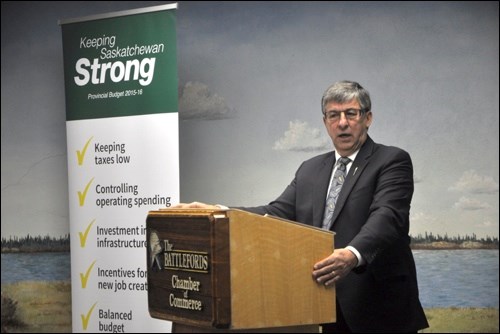Next year, it will be a new person delivering the post-budget breakfast speech at the Battlefords Chamber of Commerce.
Provincial Finance Minister Ken Krawetz is retiring from politics next year. His 2015 budget was his last as finance minister, and was the focus of his final appearance in that role at the post-budget breakfast event March 30.
There weren’t any surprises in his address to the assembled guests, some of whom took time to thank the minister on his years of political service.
One line item on the budget earned particular praise.
“I must say thank you, thank you, thank you, for the announcement of Saskatchewan Hospital,” said Glenn Wouters, who also sits on the Prairie North Regional Health Authority board.
That came in response to the commitment in the budget of $129 million towards the combined Sask. Hospital-integrated correctional facility project.
Wouters did point out an emerging issue of ensuring the new hospital would not be short of registered psychiatric nurses.
“It’s time to bring back the Saskatchewan Hospital RPN training program in the Battlefords,” Wouters said.
Mayor Ian Hamilton asked Krawetz for clarification about whether the build for Saskatchewan Hospital would be financed as a P3 — private public partnership.
Krawetz said the only one that was confirmed as a P3 at this point is Swift Current’s facility.
“We are currently in the last probably three to four months on the Regina bypass, on the 18 schools and the North Battleford hospital.”
The evaluations of VFM — or value for money — were being calculated, Krawetz added. “if that VFM is there then we’re moving forward with the P3.”
Krawetz also said the project is “going ahead regardless.”
“If it goes the method of a P3, of course, we’re setting some of that cost over a longer period of time, but it will happen,” said Krawetz.
In speaking to reporters, Krawetz noted now was the time to proceed with the project.
“We’ve reached the point where it requires the funding,” said Krawetz.
“We’ve now reached the point where we’re into a evaluation for whether or not it will be a P3, and if it does show that over the next three months we will be doing it by way of a P3 method and we will be moving forward.”
There were some tough questions for Krawetz, however. One came from Light of Christ school board chair Glen Gantefoer about when school boards can “expect to receive funding that’s in synch with the way that we’re required to plan a budget.”
Krawetz responded he didn’t think “we’ll ever get to the point where we’ll have a municipal revenue sharing formula for school boards.” As for the current formula, Krawetz admitted there were “certain things within the formula that need to be looked at to ensure that we’re achieving the goal that we want to.”
Overall, the budget had been a challenging one for Krawetz, which he acknowledged in his remarks. Krawetz noted the impact of the almost $700 million hit to oil revenues.
But the provincial government did come down with a balanced budget, which wasn’t the case in Alberta where a deficit budget with several tax hikes was tabled last week.
In speaking to reporters Krawetz pointed to a more diverse economy and strength in potash, agriculture and others sectors as key differences to Alberta’s situation.
“As a result of strength in other areas, we chose a different path. We chose to control spending and not increase taxes,” said Krawetz.




